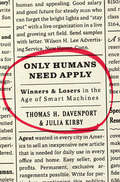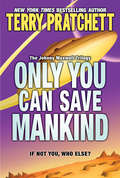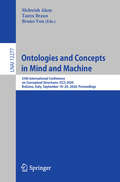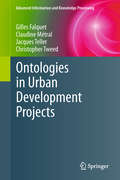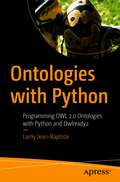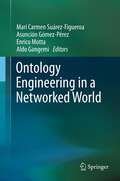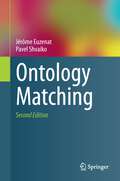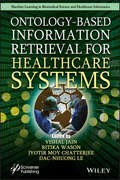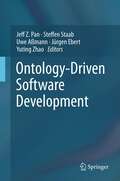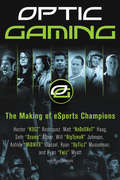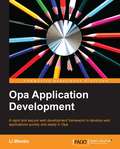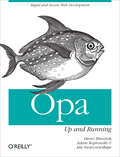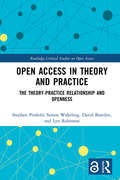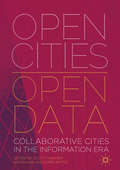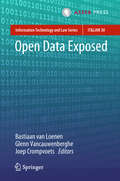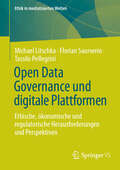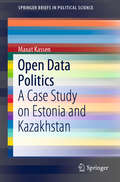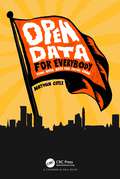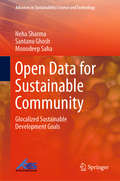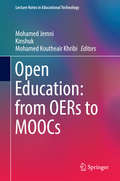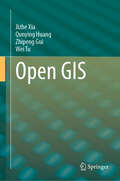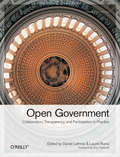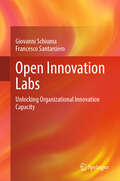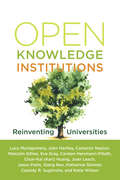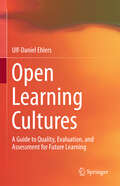- Table View
- List View
Only Humans Need Apply: Winners & Losers in the Age of Smart Machines
by Thomas H. Davenport Julia KirbyHow should we adapt to an AI-driven future? “The world the authors describe may be unsettling, but it is [one we] will likely live to see.” —The Wall Street JournalNearly half of all working Americans could be at risk losing their jobs because of technology. That includes millions of knowledge workers—writers, paralegals, assistants, medical technicians—now threatened by accelerating advances in artificial intelligence.The industrial revolution shifted workers from farms to factories. In Era One of automation, machines relieved humans of manually exhausting work. Today, Era Two of automation continues to wash across the entire services-based economy that has replaced jobs in agriculture and manufacturing. Era Three, and the rise of AI, is dawning. Smart computers are demonstrating they are capable of making better decisions than humans. Brilliant technologies can now decide, learn, predict, and even comprehend much faster and more accurately than the human brain, and their progress is accelerating. Where will this leave lawyers, nurses, teachers, and editors? How do we find sustainable careers in the near future?Only Humans Need Apply reframes the conversation about automation, arguing that the future of increased productivity and business success isn’t either human or machine. It’s both. The key is augmentation, utilizing technology to help humans work better, smarter, and faster. Instead of viewing these machines as competitive interlopers, we can see them as partners and collaborators in creative problem-solving as we move into the next era together. The choice is ours.“A fine call to action in the face of uncertainty.” —Financial Times
Only You Can Save Mankind (Johnny Maxwell Trilogy #1)
by Terry PratchettThe alien spaceship is in his sights. His finger is on the Fire button. Johnny Maxwell is about to set the new high score on the computer game Only You Can Save Mankind. <P><P>Suddenly:We wish to talk. <P><P>Huh? <P><P> We surrender. <P><P>The aliens aren't supposed to surrender -- they're supposed to die! Now what is Johnny going to do with a fleet of alien prisoners who know their rights under the international rules of war and are demanding safe-conduct? It's hard enough trying to save Mankind from the Galactic Hordes. It's even harder trying to save the Galactic Hordes from Mankind. <P><P>But it's just a game, isn't it? Isn't it? <P><P>Master storyteller Terry Pratchett leaves readers breathless -- with laughter, and with suspense -- in a reality-bending tale of virtual heroism.
Ontologies and Concepts in Mind and Machine: 25th International Conference on Conceptual Structures, ICCS 2020, Bolzano, Italy, September 18–20, 2020, Proceedings (Lecture Notes in Computer Science #12277)
by Mehwish Alam Tanya Braun Bruno YunThis book constitutes the proceedings of the 25th International Conference on Conceptual Structures, ICCS 2020, held in Bolzano, Italy, in September 2020.* The 10 full papers, 5 short papers and 1 poster paper presented were carefully reviewed and selected from 24 submissions. The proceedings also include two keynotes and two tutorials. The papers focus on the representation of and reasoning with conceptual structures in a variety of contexts. The topics of this year's conference range from formal concept analysis to decision making, from machine learning to natural language processing. *The conference was held virtually due to the COVID-19 pandemic.
Ontologies in Urban Development Projects
by Jacques Teller Claudine Métral Christopher Tweed Gilles FalquetOntologies are increasingly recognized as essential tools in information science. Although the concepts are well understood theoretically , the practical implementation of ontologies remains challenging. In this book, researchers in computer science, information systems, ontology engineering, urban planning and design, civil and building engineering, and architecture present an interdisciplinary study of ontology engineering and its application in urban development projects. The first part of the book introduces the general notion of ontology, describing variations in abstraction level, coverage, and formality. It also discusses the use of ontologies to achieve interoperability, and to represent multiple points of view and multilingualism. This is illustrated with examples from the urban domain. The second part is specific to urban development. It covers spatial and geographical knowledge representation, the creation of urban ontologies from various knowledge sources, the interconnection of urban models and the interaction between standards and domain models. The third part presents case studies of the development of ontologies for urban mobility, urban morphological processes, road systems, and cultural heritage. Other cases report on the use of ontologies to solve urban development problems, in construction business models, building regulations and urban regeneration. It concludes with a discussion of key challenges for the future deployment of ontologies in this domain. This book bridges the gap between urban practitioners and computer scientists. As the essence of most urban projects lies in making connections between worldviews, ontology development has an important role to play, in promoting interoperability between data sources, both formal (urban databases, Building Integrated Models, Geographical Information Systems etc.) and less formal (thesauri, text records, web sources etc.). This volume offers a comprehensive introduction to ontology engineering for urban development. It is essential reading for practitioners and ontology designers working in urban development.
Ontologies with Python: Programming OWL 2.0 Ontologies with Python and Owlready2
by Lamy Jean-BaptisteUse ontologies in Python, with the Owlready2 module developed for ontology-oriented programming. You will start with an introduction and refresher on Python and OWL ontologies. Then, you will dive straight into how to access, create, and modify ontologies in Python. Next, you will move on to an overview of semantic constructs and class properties followed by how to perform automatic reasoning. You will also learn about annotations, multilingual texts, and how to add Python methods to OWL classes and ontologies. Using medical terminologies as well as direct access to RDF triples is also covered. Python is one of the most used programming languages, especially in the biomedical field, and formal ontologies are also widely used. However, there are limited resources for the use of ontologies in Python. Owlready2, downloaded more than 60,000 times, is a response to this problem, and this book is the first one on the topic of using ontologies with Python.What You Will LearnUse Owlready2 to access and modify OWL ontologies in PythonPublish ontologies on dynamic websitesPerform automatic reasoning in PythonUse well-known ontologies, including DBpedia and Gene Ontology, and terminological resources, such as UMLS (Unified Medical Language System)Integrate Python methods in OWL ontologies Who Is This Book ForBeginner to experienced readers from biomedical sciences and artificial intelligence fields would find the book useful.
Ontology Engineering in a Networked World
by Aldo Gangemi Asunción Gómez-Pérez Enrico Motta Mari Carmen Suárez-FigueroaThe Semantic Web is characterized by the existence of a very large number of distributed semantic resources, which together define a network of ontologies. These ontologies in turn are interlinked through a variety of different meta-relationships such as versioning, inclusion, and many more. This scenario is radically different from the relatively narrow contexts in which ontologies have been traditionally developed and applied, and thus calls for new methods and tools to effectively support the development of novel network-oriented semantic applications. This book by Suárez-Figueroa et al. provides the necessary methodological and technological support for the development and use of ontology networks, which ontology developers need in this distributed environment. After an introduction, in its second part the authors describe the NeOn Methodology framework. The book's third part details the key activities relevant to the ontology engineering life cycle. For each activity, a general introduction, methodological guidelines, and practical examples are provided. The fourth part then presents a detailed overview of the NeOn Toolkit and its plug-ins. Lastly, case studies from the pharmaceutical and the fishery domain round out the work. The book primarily addresses two main audiences: students (and their lecturers) who need a textbook for advanced undergraduate or graduate courses on ontology engineering, and practitioners who need to develop ontologies in particular or Semantic Web-based applications in general. Its educational value is maximized by its structured approach to explaining guidelines and combining them with case studies and numerous examples. The description of the open source NeOn Toolkit provides an additional asset, as it allows readers to easily evaluate and apply the ideas presented.
Ontology Matching
by Jérôme Euzenat Pavel ShvaikoOntologies tend to be found everywhere. They are viewed as the silver bullet for many applications, such as database integration, peer-to-peer systems, e-commerce, semantic web services, or social networks. However, in open or evolving systems, such as the semantic web, different parties would, in general, adopt different ontologies. Thus, merely using ontologies, like using XML, does not reduce heterogeneity: it just raises heterogeneity problems to a higher level. Euzenat and Shvaiko's book is devoted to ontology matching as a solution to the semantic heterogeneity problem faced by computer systems. Ontology matching aims at finding correspondences between semantically related entities of different ontologies. These correspondences may stand for equivalence as well as other relations, such as consequence, subsumption, or disjointness, between ontology entities. Many different matching solutions have been proposed so far from various viewpoints, e. g. , databases, information systems, and artificial intelligence. The second edition of Ontology Matching has been thoroughly revised and updated to reflect the most recent advances in this quickly developing area, which resulted in more than 150 pages of new content. In particular, the book includes a new chapter dedicated to the methodology for performing ontology matching. It also covers emerging topics, such as data interlinking, ontology partitioning and pruning, context-based matching, matcher tuning, alignment debugging, and user involvement in matching, to mention a few. More than 100 state-of-the-art matching systems and frameworks were reviewed. With Ontology Matching, researchers and practitioners will find a reference book that presents currently available work in a uniform framework. In particular, the work and the techniques presented in this book can be equally applied to database schema matching, catalog integration, XML schema matching and other related problems. The objectives of the book include presenting (i) the state of the art and (ii) the latest research results in ontology matching by providing a systematic and detailed account of matching techniques and matching systems from theoretical, practical and application perspectives.
Ontology-Based Information Retrieval for Healthcare Systems
by Ritika Wason Dac-Nhuong Le Jyotir Moy Chatterjee Vishal JainWith the advancements of semantic web, ontology has become the crucial mechanism for representing concepts in various domains. For research and dispersal of customized healthcare services, a major challenge is to efficiently retrieve and analyze individual patient data from a large volume of heterogeneous data over a long time span. This requirement demands effective ontology-based information retrieval approaches for clinical information systems so that the pertinent information can be mined from large amount of distributed data.This unique and groundbreaking book highlights the key advances in ontology-based information retrieval techniques being applied in the healthcare domain and covers the following areas: Semantic data integration in e-health care systems Keyword-based medical information retrieval Ontology-based query retrieval support for e-health implementation<br style="background-color: transparent; box-sizing: border-box; color: #455464; font-family: " sourcesanspro","helvetica neue","helvetica",arial,sans-serif; font-size: 1
Ontology-Driven Software Development
by Steffen Staab Jeff Z. Pan Jürgen Ebert Uwe Aßmann Yuting ZhaoThis book is about a significant step forward in software development. It brings state-of-the-art ontology reasoning into mainstream software development and its languages. Ontology Driven Software Development is the essential, comprehensive resource on enabling technologies, consistency checking and process guidance for ontology-driven software development (ODSD). It demonstrates how to apply ontology reasoning in the lifecycle of software development, using current and emerging standards and technologies. You will learn new methodologies and infrastructures, additionally illustrated using detailed industrial case studies. The book will help you: Learn how ontology reasoning allows validations of structure models and key tasks in behavior models.Understand how to develop ODSD guidance engines for important software development activities, such as requirement engineering, domain modeling and process refinement.Become familiar with semantic standards, such as the Web Ontology Language (OWL) and the SPARQL query language.Make use of ontology reasoning, querying and justification techniques to integrate software models and to offer guidance and traceability supports.This book is helpful for undergraduate students and professionals who are interested in studying how ontologies and related semantic reasoning can be applied to the software development process. In addition, itwill also be useful for postgraduate students, professionals and researchers who are going to embark on their research in areas related to ontology or software engineering.
OpTic Gaming: The Making of eSports Champions
by Fwiz H3cz Midnite Scump Optic J Bigtymer NadeshotOpTic Gaming, the four-time Call of Duty Major League Gaming Champions and one of the top eSports teams in the world, now takes fans behind the controller--into the game and the minds of the greatest gamers in the world--in this fascinating and unique memoir and insider guide.Emerging on the scene in 2006, OpTic Gaming has dominated the Call of Duty e-sports arena, thanks to the talents of legendary players such as Matt "NaDeSHoT" Haag, the biggest eSports personality on earth; Seth "Scump" Abner, the best Call of Duty player in the world; Midnite, one of the first girl gamers to rise to stardom on YouTube; and Hector "H3CZ" Rodriguez, the team founder and CEO. With over 14 million followers across social platforms like Twitter, Facebook and YouTube, no other team of players in eSports can match OpTic's popularity or ability to bring fans into the game.Now, these remarkable players have collaborated to produce this one-of-a-kind book. In OpTic Gaming, they candidly share their story of becoming Call of Duty's global royalty--ESPN XGAMES, MLG, ESWC and GFINITY champions--laying bare their lives, exploring what it takes to make it in professional gaming, and speaking honestly about the consequences of their newfound fame. These best-of-the-best take you behind the controller, offering insights, knowledge, and strategies to help you improve your shot, master the most complex maps, and conquer the game with the ultimate weapons. Going beyond their number-one game, the team also discusses the rest of their lineups and how to become a champion in any arena. Revealing their go-to strategies, best missions, and favorite challenges, OpTic Gaming brings fans closer to these wildly popular professional gamers more than ever before.
Opa Application Development
by Li WenboIt is a tutorial guide to learning how to use Opa with JavaScript, Nodejs, and MongoDB to develop web applications easily and effectively.If you are a web developer who wants to get started with the Opa framework and build web applications with it? Then this book is for you. Web development experience is assumed and would be helpful.
Opa: Rapid and Secure Web Development
by Henri Binsztok Adam Koprowski Ida SwarczewskajaWant to simplify web development? This hands-on book shows you how to write frontend and backend code simultaneously, using the Opa framework. Opa provides a complete stack for web application development, including a web server, database engine, distribution libraries, and a programming language that compiles to JavaScript. You’ll learn step-by-step how to use Opa by building two projects through the course of the book: a wiki application similar to Wikipedia, and a Twitter-like micro-blogging platform. Discover how easy it is to use Opa to develop applications with real-time updates, database interactions, and web service design. Do you have JavaScript experience? You’re ready to get started.Learn fundamental concepts, including Opa’s functional programming styleDiscover how Opa compiles to JavaScript, using jQuery on the frontend and Node.js on the serverConstruct HTML resources dynamically and embed static resources on an Opa serverUse Opa’s method for performing CRUD operations and storing key-value pairs in MongoDBBuild an Opa user interface with the Bootstrap toolkit from TwitterLearn variant types, pattern-matching, polymorphic types, recursive functions, and other advanced featuresManage user accounts by building login forms, handling account activation, and tracking logged usersBuild a reactive UI—a real-time interface that continuously updates user events
Open Access in Theory and Practice: The Theory-Practice Relationship and Openness (Routledge Critical Studies on Open Access)
by David Bawden Lyn Robinson Stephen Pinfield Simon WakelingOpen Access in Theory and Practice investigates the theory-practice relationship in the domain of open access publication and dissemination of research outputs. Drawing on detailed analysis of the literature and current practice in OA, as well as data collected in detailed interviews with practitioners, policymakers, and researchers, the book discusses what constitutes ‘theory’, and how the role of theory is perceived by both theorists and practitioners. Exploring the ways theory and practice have interacted in the development of OA, the authors discuss what this reveals about the nature of the OA phenomenon itself and the theory-practice relationship. Open Access in Theory and Practice contributes to a better understanding of OA and, as such, should be of great interest to academics, researchers, and students working in the fields of information science, publishing studies, science communication, higher education policy, business, and economics. The book also makes an important contribution to the debate of the relationship between theory and practice in information science, and more widely across different fields of the social sciences and humanities
Open Cities | Open Data: Collaborative Cities in the Information Era
by Hoon Han Scott Hawken Christopher PetitToday the world’s largest economies and corporations trade in data and its products to generate value in new disruptive markets. Within these markets vast streams of data are often inaccessible or untapped and controlled by powerful monopolies. Counter to this exclusive use of data is a promising world-wide “open-data” movement, promoting freely accessible information to share, reuse and redistribute. The provision and application of open data has enormous potential to transform exclusive, technocratic “smart cities” into inclusive and responsive “open-cities”.This book argues that those who contribute urban data should benefit from its production. Like the city itself, the information landscape is a public asset produced through collective effort, attention, and resources. People produce data through their engagement with the city, creating digital footprints through social medial, mobility applications, and city sensors. By opening up data there is potential to generate greater value by supporting unforeseen collaborations, spontaneous urban innovations and solutions, and improved decision-making insights. Yet achieving more open cities is made challenging by conflicting desires for urban anonymity, sociability, privacy and transparency. This book engages with these issues through a variety of critical perspectives, and presents strategies, tools and case studies that enable this transformation.
Open Data Exposed (Information Technology and Law Series #30)
by Joep Crompvoets Bastiaan Van Loenen Glenn VancauwenbergheThe main objectives of this book are to expose key aspects that have a relevance when dealing with open data viewed from different perspectives and to provide appealing examples of how open data is implemented worldwide.The concept of open data as we know it today is the result of many different initiatives, both of a legislative and non-legislative nature, and promoted by a wide range of actors. Numerous regulatory antecedents to foster the concept of open data and embed it in national and international policy agendas have been undertaken on both sides of the Atlantic, as well as at a supranational level. The book highlights a number of the efforts made to promote open data in Europe, Asia and the United States. In addition to new insights, practical guidance and multiple disciplinary perspectives on open data, the book also addresses the transformation of current developments towards open data, which may be referred to as the democratisation of data. This book will support open data practitioners as well as open data scholars in their endeavours to promote open data implementation and research.Bastiaan van Loenen is associate professor and director of the Knowledge Centre Open Data at the Faculty of Architecture and The Built Environment of Delft University of Technology in the Netherlands, as is Glenn Vancauwenberghe, who is a post-doctoral researcher, and Joep Crompvoets is a professor at the Public Governance Institute of the KU Leuven in Belgium.
Open Data Governance und digitale Plattformen: Ethische, ökonomische und regulatorische Herausforderungen und Perspektiven (Ethik in mediatisierten Welten)
by Tassilo Pellegrini Michael Litschka Florian SaurweinDieses Buch behandelt ethische, ökonomische und regulatorische Aspekte der Open Data Governance bei digitalen Plattformen. Wie Unternehmen der digitalen Ökonomie mit offenen Daten umgehen, wirft viele gesellschaftlich relevante Fragen auf: Wie können offene Daten und der darauf beruhende Content möglichst weit in der Bevölkerung verbreitet werden? Wie kann Content Moderation transparent organisiert und wie können Dateninfrastrukturen sozial erwünscht gestaltet werden? Das Buch analysiert die Fallstudien offene digitale Public-Value Plattformen, offene digitale Dateninfrastrukturen und Content Moderation und Kuratierung auf digitalen Plattformen und entwickelt Governance-Modelle, die eine Beurteilung verschiedener Regulierungsmöglichkeiten für Unternehmen der digitalen Plattformökonomie ermöglichen.
Open Data Politics: A Case Study on Estonia and Kazakhstan (SpringerBriefs in Political Science)
by Maxat KassenThis book offers a cross-national comparison of open data policies in Estonia and Kazakhstan. By analyzing a broad range of open data-driven projects and startups in both countries, it reveals the potential that open data phenomena hold with regard to promoting public sector innovations. The book addresses various political and socioeconomic contexts in these two transitional societies, and reviews the strategies and tactics adopted by policymakers and stakeholders to identify drivers of and obstacles to the implementation of open data innovations. Given its scope, the book will appeal to scholars, policymakers, e-government practitioners and open data entrepreneurs interested in implementing and evaluating open data-driven public sector projects.
Open Data for Everybody: Using Open Data for Social Good
by Nathan CoyleWhat if I told you something that could empower our third sector and activists to enhance their capacity? From gathering evidence for funding tenders to campaigning for crucial social issues and much more? It's called open data, yet many in social action remain unaware of it. Primarily shaped by corporate entities, open data seems tailored only for technologists, alienating the third sector. But in reality, it's a powerful tool for social change, bolstering civil society, and creating resilient communities.This book argues a simple point: if open data and the digital aspects that support it aren't accessible to all, then what is the point of it? In an age where technology should be seen as a fundamental human right, it's time to rethink outreach. Deeply rooted in grassroots social activism, this book explores a journey that led to collaborations with governments globally, based on real hands-on work, aiming to democratize open data. Through narrative storytelling, we share insights, best practices, procedures, and community-driven approaches. Regardless of your skill set or organization size, from grassroots workers to third-sector professionals and government officers, join us to reshape the perception of open data, fostering change in neighborhoods.Open Data for Everybody: Using Open Data for Social Good is a love letter to open data's transformative power. To create solutions, understanding the problem is crucial. This book seeks to return control to the real experts—those living and working within our communities.
Open Data for Sustainable Community: Glocalized Sustainable Development Goals (Advances in Sustainability Science and Technology)
by Neha Sharma Santanu Ghosh Monodeep SahaThis book is an attempt to bring value to the enterprise pursuits in the areas of research and innovation around the specific issues in terms of topic selection, open data resources and researcher orientation. Over the last 300 years, industrial revolutions have had game-changing impact on societies. Presently, by and large, we are at the crossroads of the fourth industrial revolution, where phygital systems are going to play a massive role, where digital systems can simulate and go beyond the limitations of the physical world, thereby enabling a new world order. This transformation is cutting across every sphere known to mankind. The world will become a globally localized marketplace. In today’s business world, sustainability is a corporate agenda. Enterprises are also aiming to be purpose-driven, adaptive and resilient to disruptions. The contributions to community and environment are part of their corporate branding. The book explores and presents a part of the open data sets from government institutions to achieve the sustainable goals at local level, in turn contributing towards global mission. As the topic suggests, the authors are looking at some of the specific issues in the areas of environment, agriculture and health care through the lens of data science. The authors believe that the above three areas chosen have deep relevance in today’s world. The intent is to explore these issues from a data and analytics perspective and identify cracks through which deeper inroads can be made. Conscious efforts have been taken to make use of all the major data science techniques like prediction, classification, clustering, and correlation. Given the above background, deeper waters will be explored through the contents of this book.
Open Education: from OERs to MOOCs
by Kinshuk Mohamed Jemni Mohamed Koutheair KhribiThis book focuses on the emerging phenomenon of Massive Open Online Courses (MOOCs), which are changing the fundamental underpinning of educational systems worldwide and forcing educators and other stakeholders to re-think the way instruction is currently conducted. It examines the origins of MOOCs within the context of the open education movement, and reviews current policies, guidelines and initiatives to promote the use of ICT in education through the development and use of open educational resources from international practices, including implementation and licensing issues. With a particular focus on new trends in MOOCs, the book explores the potential of this emerging paradigm, its rise and its impact on openness in education. Various new initiatives are also presented, including more global examples and those that are more geared to certain regional contexts. The book is intended as a stepping stone for both researchers and practitioners who are looking to approach MOOCs from a holistic perspective.
Open GIS
by Qunying Huang Jizhe Xia Zhipeng Gui Wei TuThis book provides a comprehensive introduction about recent state-of-the-art advancements in Open GIS, including Open GIS data, services, software, and libraries for GIS programming. Though GIS software has entered the era of Open GIS alongside the emerging trend of open source software, there is no suitable book for GIS educators to teach our next generation, and for professionals to gain an in-depth understanding about Open GIS technologies and toolkits. This book intends to provide this missing guidance for students, educators and professionals in geospatial fields to quickly find, learn and use a wide arrange of open-sourced data, tools, and programming for geospatial applications. The book begins with an introduction to open data, and discusses data management solutions, including both open-sourced relational databases and NoSQL database systems for big data. Next, the book covers different GIS and remote sensing software, tools and programminglibraries to perform spatial statistics and analyses. Readers will learn about the tools and libraries for desktop and web GIS development for both two dimensional (2D) and three dimensional (3D) mapping and visualization. Finally, the book provides two example of Open GIS applications including public health and natural hazards. At the end of each chapter, practical hands-on exercises are included for readers to fully master the most popular Open GIS technologies introduced in the chapter.
Open Government: Collaboration, Transparency, and Participation in Practice
by Daniel Lathrop Laurel RumaIn a world where web services can make real-time data accessible to anyone, how can the government leverage this openness to improve its operations and increase citizen participation and awareness? Through a collection of essays and case studies, leading visionaries and practitioners both inside and outside of government share their ideas on how to achieve and direct this emerging world of online collaboration, transparency, and participation.Contributions and topics include:Beth Simone Noveck, U.S. Deputy Chief Technology Officer for open government, "The Single Point of Failure"Jerry Brito, senior research fellow at the Mercatus Center at George Mason University, "All Your Data Are Belong to Us: Liberating Government Data"Aaron Swartz, cofounder of reddit.com, OpenLibrary.org, and BoldProgressives.org, "When Is Transparency Useful?"Ellen S. Miller, executive director of the Sunlight Foundation, "Disrupting Washington's Golden Rule"Carl Malamud, founder of Public.Resource.Org, "By the People"Douglas Schuler, president of the Public Sphere Project, "Online Deliberation and Civic Intelligence"Howard Dierking, program manager on Microsoft's MSDN and TechNet Web platform team, "Engineering Good Government"Matthew Burton, Web entrepreneur and former intelligence analyst at the Defense Intelligence Agency, "A Peace Corps for Programmers"Gary D. Bass and Sean Moulton, OMB Watch, "Bringing the Web 2.0 Revolution to Government"Tim O'Reilly, founder and CEO of O'Reilly Media, "Defining Government 2.0: Lessons Learned from the Success of Computer Platforms"Open Government editors: Daniel Lathrop is a former investigative projects reporter with the Seattle Post Intelligencer who's covered politics in Washington state, Iowa, Florida, and Washington D.C. He's a specialist in campaign finance and "computer-assisted reporting" -- the practice of using data analysis to report the news. Laurel Ruma is the Gov 2.0 Evangelist at O'Reilly Media. She is also co-chair for the Gov 2.0 Expo.
Open Innovation Labs: Unlocking Organizational Innovation Capacity
by Giovanni Schiuma Francesco SantarsieroThis book allows readers to discover the great potential of Open Innovation Labs (OILs). The book offers a practical and in-depth exploration of OILs, guiding readers through their establishment and management. Uniting academic research and actionable insights, this book equips professionals and researchers with the tools to unlock their organization's innovation potential. The book looks into the evolution of innovation spaces, from historic inventors' workshops to modern OILs, and uncovers their impact on organizational transformation. It explores the crucial role of OILs in fostering a culture of continuous innovation and driving collaboration with diverse stakeholders. Readers will benefit from a roadmap to help create, nurture, and optimize OILs to suit their unique organizational context. With its focus on practicality and applicability, this book is a key resource for helping readers build, manage, and succeed with OILs. From business leaders to educators and policymakers, it empowers readers to shape a thriving ecosystem of innovation, leading organizations toward a future of sustainable growth and positive change.
Open Knowledge Institutions: Reinventing Universities
by John Hartley Lucy Montgomery Carmeron Neylon Malcolm Gillies Eve GrayThe future of the university as an open knowledge institution that institutionalizes diversity and contributes to a common resource of knowledge: a manifesto.In this book, a diverse group of authors—including open access pioneers, science communicators, scholars, researchers, and university administrators—offer a bold proposition: universities should become open knowledge institutions, acting with principles of openness at their center and working across boundaries and with broad communities to generate shared knowledge resources for the benefit of humanity. Calling on universities to adopt transparent protocols for the creation, use, and governance of these resources, the authors draw on cutting-edge theoretical work, offer real-world case studies, and outline ways to assess universities&’ attempts to achieve openness. Digital technologies have already brought about dramatic changes in knowledge format and accessibility. The book describes further shifts that open knowledge institutions must make as they move away from closed processes for verifying expert knowledge and toward careful, mediated approaches to sharing it with wider publics. It examines these changes in terms of diversity, coordination, and communication; discusses policy principles that lay out paths for universities to become fully fledged open knowledge institutions; and suggests ways that openness can be introduced into existing rankings and metrics. Case studies—including Wikipedia, the Library Publishing Coalition, Creative Commons, and Open and Library Access—illustrate key processes.
Open Learning Cultures
by Ulf-Daniel EhlersToday we are seeing a new form of blended learning: not only is technology enhancing the learning environment but formal and informal learning are combining and there is self- and peer-assessment of results. Open learning cultures are challenging the old and long-practiced methods used by educators and transforming learning into a more student-driven and independent activity , which uses online tools such as blogs, wikis or podcasts to connect resources, students and teachers in a novel way. While in higher education institutions most assessments are still tied to formal learning scenarios, teachers are more and more bound to recognize their students' informal learning processes and networks. This book will help teachers, lecturers and students to better understand how open learning landscapes work, how to define quality and create assessments in such environments, and how to apply these new measures. To this end, Ehlers first elaborates the technological background for more collaborative, distributed, informal, and self-guided learning. He covers the rise of social media for learning and shows how an architecture of participation can change learning activities. These new paradigms are then applied to learning and education to outline what open learning landscapes look like. Here he highlights the shift from knowledge transfer to competence development, the increase in lifelong learning, and the importance of informal learning, user generated content, and open educational resources. He then shows how to manage quality by presenting a step by step guide to developing customized quality concepts for open learning landscapes. Finally, several methods dealing with assessment in these new environments are presented, including guidelines, templates and use cases to exemplify the approaches. Overall, Ehlers argues for assessment as an integral part of learning processes, with quality assurance as a method of stimulating a quality culture and continuous quality development rather than as a simple controlling exercise.
